by Debbie Burke
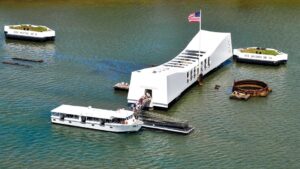
Arizona Memorial Pearl Harbor
Photo credit nps.gov
Today is December 7th, 2021, the 80th anniversary of the attack on Pearl Harbor that launched the US into World War II in 1941.
Few people are alive today who remember “a date which will live in infamy” (President Franklin Delano Roosevelt).
Fewer still are people who survived the attack that morning in Pearl Harbor. The last ones are in their late 90s to 100+ years.
The closest that we in 2021 can come to learning about that day are stories collected and recorded at this link.
December 7, 1941 was a pivotal date that changed the history of the entire world.
Our parents, grandparents, and great-grandparents could all tell you exactly where they were and what they were doing on that day.
Long before tattoos became a fashion statement, many young sailors had “Remember Pearl Harbor” permanently inked on their arms.
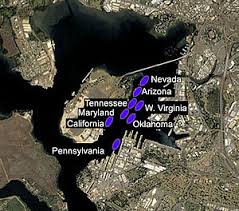
Battleship Row Pearl Harbor
Photo credit – US govt.
On December 7, 1941, my husband’s grandfather was serving on the USS Tennessee docked on Battleship Row. During the attack, his duty was to grab burning sailors who were being handed up to him from below decks. He then had to throw them over the side of the battleship, far enough out that they didn’t strike the anti-torpedo blister, in order to extinguish the flames consuming their clothes and bodies.
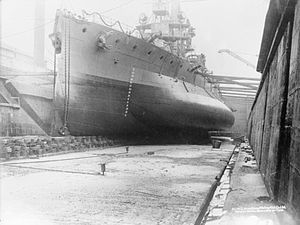
Anti-torpedo blister
Photo credit – Wikipedia
When the USS Arizona blew up, his back was toward the explosion. He was horribly burned but, after a year in the hospital, he returned to duty through the end of the war. His back was forever scarred like a topographic relief map.
About ten years ago at a gym, my husband was talking with an older man on an adjacent treadmill about World War II and specifically Pearl Harbor. A young man about 20 who overheard their conversation approached. He was a junior in college, polite, well-spoken, articulate, and appeared to be a curious, conscientious student.
He asked my husband, “Excuse me, sir, can you tell me what Pearl Harbor is?”
Apparently the “date which will live in infamy” was no longer taught in school.
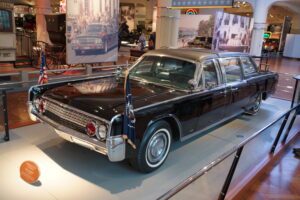
JFK Lincoln Continental – photo credit Wikimedia
November 22, 1963 was the defining date of infamy for my generation of Baby Boomers. We can all tell you exactly where we were and what we were doing when we learned the news that President John F. Kennedy had been assassinated.
Again, the world shifted on its axis and events that occurred after that date were forever stained by it.
About five years ago, my husband and I were chatting with a young woman working her way through college as a server in a restaurant. We mentioned John F. Kennedy. She said, “Kennedy? Wasn’t he a president that was killed in a car crash?”
Apparently, my generation’s date in infamy is now a barely-remembered blip in history.
Two years from now will mark the 60th anniversary of JFK’s assassination. Oh my, that makes me feel old.
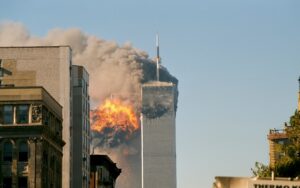
World Trade Center – photo credit Wikimedia CC BY-SA 2.0
September 11, 2001 again changed the entire world. Generations born after that date have never known air travel without the TSA, body scanners, pat-downs, luggage X-rays and searches.
2020 doesn’t have one specific date when the entire globe changed. But just the mention of “2020” is enough to provoke a sigh, a grimace, or an eye roll in every person of the age of cognizance who’s alive today.
2020 is part of our collective consciousness, as December 7, November 22, and September 11 were part of the collective consciousness of earlier generations.
Last week, a friend came to visit with her 18-month-old baby who was born in 2020. We were contemplating what Aubrey’s future might look like. Because of pandemic restrictions, she hadn’t encountered many people outside her close family and almost no one around her age.
Recently, they had gone to a playground where Aubrey saw other toddlers for the first time and reacted with amazement and curiosity. She approached a little boy and touched him.
The boy’s mother immediately swooped in and picked up the child, scolding, “We don’t touch.”
People born after December 7, 1941 never knew a world that wasn’t profoundly influenced by World War II. That was their frame of reference, their concept of “normal.”
Same for people born after November 22, 1963 and September 11, 2001. They never knew what the world was like before JFK’s assassination or before planes struck the World Trade Center and the Pentagon.
What will school be like for Aubrey in a few years? We don’t know. But, whatever the circumstances are, that will be “normal” to her because it’s the only frame of reference she knows.
The generation born in 2020 or later will never fully realize the world was once a different place.
Aubrey won’t know that parents once thought it was perfectly normal socialization for children to play, touch, push, hug, and watch each other’s reactions.
What does all this have to do with writing?
Nothing and everything.
As writers, we record the world we live in, or research, or make up. We also contrast our story worlds with other locales, other cultures, other periods in history, and even imaginary journeys into the future.
Throughout time, writers have chronicled the collective consciousness of different generations.
No matter the genre—crime, romance, history, fantasy, horror, nonfiction, etc.—we capture the zeitgeist, which Merriam-Webster defines that as “the general intellectual, moral, and cultural climate of an era.”
That’s an awesome, daunting responsibility.
~~~
Eighty years later, is Pearl Harbor relevant in today’s world?
A handful of remembrance ceremonies will be held today but, in a few more generations, there won’t even be ceremonies.
The date will fade into obscurity like April 14, 1865.
What happened on that date?
Back then, every American could probably tell you exactly where they were and what they were doing when they learned Abraham Lincoln had been shot that night and died the following morning.
Time marches forward. Younger generations replace older ones who have been the keepers of the memories. Old memories are forgotten and new ones take their places.
If future generations find our stories on the dusty shelves of cyberspace, they may smile or scoff at quaint, outdated references.
But I hope they will also recognize human truths we wrote about that transcend time.
Dates like December 7, 1941 are still worth remembering and worth writing about because of the people in Pearl Harbor who made history.
~~~
Today is my last post in 2021 before TKZ goes on annual hiatus.
I’m grateful for your friendship and interest. Except for the written word, we probably wouldn’t have met. So glad we did!
Warmest holiday wishes to you and your loved ones.
~~~
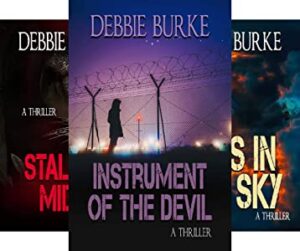
Special holiday prices for all Tawny Lindholm Thrillers with Passion through the end of the year. A great gift for your reading friends…or yourself!

My mom’s uncle was a chief boatswains mate at Pearl Harbor, assigned ashore, and he spent several days down at the harbor sending sailors uphill to his home where his wife fed them for only the word of where they’d seen Joe and that he was alright. He survived the war and retired in San Diego after 25 years in the Navy.
I was in the back seat of the family car with my grandmother in front while Mom was shopping in a Publix in Perrine, Florida – south of Miami – when Mom came came out with the news from Dallas. I was five, but still remember the black-n-white TV coverage, and 20+ years later Dad and I were in Dallas and inadvertently found ourselves driving through Dealy Plaza – how ordinary and normal it all seemed.
9/11 found me walking ahead of a hospital survey team in the MRI building of the hospital where I work, catching the headline of the first plane to strike the WTC, thinking at first it was an accident, but as they day progressed and I moved through the hospital ahead of the team, I learned what had happened one waiting room TV at a time…
As for the ‘Vid-demic, I started, albeit a bit late, to journal again, documenting what was going on in what I call the “Covid Chronicles,” noting how many days into things we were, and the subsequent political and cultural boiling over that followed in the late spring and summer into the fall of 2020 (and beyond) – primarily for my grandson who was born in 2018 and who I realized would not know a world without at least some peopled masked and, it seems, almost everybody else angry….
And of course there are the personal “where where you” moments – when we learn that family and friends have passed, or have been a part of some distant cataclysmic event that “only” rattled their part of the world – the Atlanta tornado in 2008 (I was hunkered down and watching the weather updates, 20 miles south), the Christmas tsunami in 2004 (my friend was working in a hotel in Seychells when the wave crossed the island), the San Francisco World Series earthquake (working in a Chic-fil-A and worrying about a friend who lived on Leavenworh above Lombard – who survived and now deals with the Oregon wildfires) – to name of couple of mine…
Thank you for remembering – and getting me to remember as well… these types of events color our lives, of course, but can also shade and tint the lives of our characters as well…
George, your grandson is fortunate that you care enough to record history while it’s happening for him to read in the future. That is far more enlightening and educational than whatever will pass for history texts by the time he’s old enough to comprehend.
Thank you for this, Debbie. You have provided us with an excellent alternative to some of the essays I’ve been reading this morning.
Merry Christmas and Happy New Year! See you in 2022!
It’s always my privilege, Joe.
Merry Christmas and Happy New Year to you and your family!
Your post this morning is exceptionally well-written, Debbie. Timely, too, as the first thing in my mailbox I opened was a historical reminder of December 7th, 1941 – a day that went down in infamy – a day that changed the world as they knew it then, and as we know it now.
November 22nd, 1963 – I remember it well. I was seven, and it was lunch time in my one-room schoolhouse in Manitoba (same time zone as Dallas), and our teacher was late returning from her break. When she did, she was very upset and dismissed us for the day after telling that President Kennedy had been assassinated. Now, I didn’t know who President Kennedy was and I learned a new word, “assassinated”. When I got home, the adults in the community were huddled around our black & white as we were one of the few families in town with a TV. I’ll never forget how disturbed they were, and the memory is so entrenched to this day that I have one wall in my writing studio dedicated to the JFK assassination which I’m still a student of to this day. (Sorry, folks, no conspiracy. Oswald did it, acting alone. Case closed.)
Two days ago, I had the first handshake in a year and a half. It was impromptu after doing a fellow a favor. Your quote, “We don’t touch”, really hit home, Debbie. I wonder if handshakes will ever be a norm again.
Thanks, Garry.
I was in Florida several months ago shortly after mask requirements were easing. A woman and I passed each other in the doorway of a restaurant and she exclaimed, “It’s so nice to see people’s smiles again!”
December 7th is my brother’s birthday, a double remembrance of the date. We toured the Arizona while we were in Hawaii. I wondered what the Japanese tourists were thinking/hearing as they listened to their audio tours.
I was in my high school history class, taught by a “student teacher.” Earlier in the year, we’d been talking about the jinx of presidents elected in years ending in zero, so when our “regular” teacher came into the classroom and said Kennedy had been assassinated, our first reaction was this was a setup–until we saw the tears in his eyes. School was dismissed.
I was home working when my husband called and said “Turn on the tv. A plane crashed into the Twin Towers.” My interpretation was it was a tragic accident, but I really had a LOT of work to do. Nevertheless, I turned on the set and saw the reality of what had happened.
About 20 years ago, I took a “real” job out of the house, because I needed to earn enough money to pay for a trip to Australia, and I was a job I knew I could quit without guilt a year later. My boss was a woman barely in her 30s. I mentioned the Viet Nam war, and she had no idea what I was talking about.
I also remember November 9th, the anniversary of Kristallnacht. One of my cousins was there and experienced it firsthand.
Terry, thanks for the remembrance of Kristallnacht, another pivotal event leading to WWII.
I too have received blank stares from younger people when I mention Vietnam. Didn’t their grandparents (who were the age to serve and/or protest) not talk about it? Or did the kids not listen?
My late father and brother were a Pearl Harbor sandwich. December 6th and 8th.
Thanks, Debbie. Re Pearl Harbor, there’s an excellent article titled “Rare photos capture the attack on Pearl Harbor from the Japanese perspective, 75 years ago.” You can find it at https://mashable.com/feature/attacking-pearl-harbor#JMtgRVkmfkqZ.
Thanks for the link, Harvey. Ironic that so little history is taught in schools at a time when the net has made such a wealth of information widely available.
Great post, Debbie. Thought provoking. A call to stop and remember.
All the dates you linked to events: Events that changed history. Events that defined a generation. Events that united that generation, but not those generations that followed.
Each date and event, like turning a page and starting a new chapter.
Today is a day to pause and remember.
Thanks for reminding us. Thanks for all your wonderful posts over the past year.
Have a wonderful holiday season. Make some memories!
Thanks for your kind words, Steve.
“Events that defined a generation. Events that united that generation, but not those generations that followed.” How true!
“Each date and event, like turning a page and starting a new chapter.” A great analogy.
Merry Christmas to you and your family!
Thanks for the remembering, Debbie. That Dec. 7 morning my dad was 22, a graduate of UCLA and Naval ROTC, and was sitting in the back yard of the home he grew up in, in Hollywood. He was happily reading a book. My grandmother heard the news on the radio and sent Dad’s baby brother, 6, out to get him. Dad at first shooed him away, but the little fella was insistent. Dad went in, heard the news, packed and reported for duty. He was assigned to a ship doing escort duty in and around Pearl, but he wanted sea duty. Scuttlebutt was that the small Patrol Craft coming into Pearl were being readied for the South Pacific. He volunteered and was assigned to the PC 477 (and wrote a memoir about the action he saw).
For young people who want to know what happened, the movie Tora! Tora! Tora! has perhaps the best recreation of the attack. Also From Here to Eternity and In Harm’s Way. If they like to read, then Herman Wouk’s The Winds of War.
Jim, I remember your dad’s WWII memoir. Personal accounts from people who were actually there at the time have an impact far beyond dry dates and names we were taught in school.
Winds of War is a true classic–actual history woven into a compelling fictional story.
Most likely November 17, 2019. The probable date of the first case of COVID-19 worldwide. A link to a US COVID timeline will be at the bottom.
OK, I am a history geek. I know the dates and their importance.
December 1941 – In late December my grandfather tries to enlist in the Army following the US entry into the war. His mother used a Hebrew Calendar. Grandpa was born on Chanukah, Kislev 25 by the Hebrew Calendar. Grandpa celebrated his birthday on December 25. It was easier. My great grandmother was a widow who remarried. Her second husband hated the children from her first. Grandpa ran away from home and joined the Army in WWI. It took two years for his mother to track him down. He was thrown out of the Army because he was under age.
Back to 1941. The enlistment office finds Grandpa’s paperwork from his WWI enlistment. He cannot join the Army. He is to old. He was actually born on December 17. He did important work on the home front. My grandmother was a nurse working some time in a POW camp in Ohio.
Alan, thanks for sharing the story of your grandfather. It perfectly illustrates how all Americans, regardless of age, gender, background, or religion, contributed to the war effort whether on the front lines or back at home.
Debbie, thank you for this post of remembrances. These dates, these moments, changed history, and I think it’s important that we remember. Of course, I have a degree in history, it’s always been a passion of mine.
My father and his youngest brother helped stoke that interest when I was child. They would talk about Pearl Harbor, the German battleship Bismarck and its fated campaign earlier in 1941 in the Atlantic, the Cuban missile crisis in October 1962, and of course, the assassination of JFK. I was two when Oswald assassinated him, so I have no memory of the event.
September 11th, 2001, I woke up shortly after 6AM here in Oregon to the radio mentioning that a small aircraft had struck one of the World Trade Center towers and groggily went out to the living room to turn on CNN, just in time to see the second plane hit. I realized instantly that this was no accident. The world changed again, in that moment.
As for 2020, I remember reading news on December 30 or 31, 2019, that there was an outbreak of a novel coronavirus in China. It wasn’t until a few weeks later that I recalled my great grandmother’s telling teenaged me her memories of the 1918-20 Flu Pandemic. Now I have a much better understanding of what she went through.
I think it’s so important to remember history and dates of significance. Thank you for doing so this morning. Have a wonderful holiday break!
Thank you, Dale. Your older relatives instilled that interest in history with their stories. Elders have passed on valuable lessons from the first gathering around the fire. If only we paid more attention….
Thanks for reminding us, Debbie.
Last year I had the honor of interviewing WWII veteran Charlie Henderson for an anthology of interviews being put together by The Forever Young Veterans organization (https://foreveryoungvets.org). Charlie served in a group that supplied fuel to the units in the Battle of the Bulge, and preserving his story was a special honor. Charlie passed away recently at the age of 99.
I think the saddest part of your very fine post was the statement, ““We don’t touch.” After so many wars and devastating events, are we to be defeated by a lowly germ?
Kay, about a year ago, I talked to a gentleman who’d been on the Yorktown at the Battle of Midway in June 1942. His eyes still misted and his voice grew hoarse when he talked about shipmates who had perished during that battle.
After the war, he opened a family nursery business in Montana that continues today. Until his death at 97 a few months ago, every day he sat in his rocker at a desk near the store’s entrance, wearing his Yorktown cap, directing customers to what they were looking for.
“We don’t touch” really struck me b/c it sums up how much children in this time are affected.
Looking forward to reading your post in the New Year.
Thanks, Ben. Wishing you and your family a wonderful holiday season.
Thanks for a great post, Debbie. Love history, and hate it that so much of it seems to be irrelevant to this generation.
The boy’s mother immediately swooped in and picked up the child, scolding, “We don’t touch.”
That is the saddest thing I’ve read in a long time. Our societies and cultures are crumbling around us because we’re losing the ability and desire to touch each other. I pray for humanity to survive this debacle and learn to touch again.
We watched a movie some time ago called The Quiet Place. Very scary movie, about a world without talking so as not to alert the bad people of your presence. I can visualize another scary movie. Untouched. Where humanity no longer has arms and hands and fingers.
May it never be.
Thanks, Deb. I’ll watch for The Quiet Place.
Wishing you and your family a warm Christmas with lots of hugs.
The thumbs are wonky today, again, so here’s for Debbie and all those who have posted so far: ?
I was only 2½ in 1941. My mother said that our Japanese gardener, “Shig,” showed up in late February, gave her a phone number and requested she call the number right away if she spotted “Yosh,” one of his crew.
Once, when my mother told me there was a war, I decided to check every day until it was over. But the next day, when I asked her, she got very upset, and I decided not to bring it up again.
The first memory I can assign to a date was FDR’s funeral. My mother and I were at the north end of the master bedroom, listening to the services on the radio, observing the minute of silence.
These details are examples of the metadata our brain stores with every memory: a date stamp, the relevant where, what, and who. During extreme emergencies, some people’s memory seems to omit the date stamp, so triggering that memory results in a recollection that is, as near as they can tell, happening right now.
Metadata is a good way to express it, J. Certain events make indelible impressions on our internal hard drives.
Wishing you and your family a wonderful holiday season.
I just learned that the last survivor of my Greatest Generation family died. My maternal aunt Violet worked in the War Office with my mom before moving south to be with her deployed husband. He was a bomber pilot who spent much of the war in a German POW camp. He never talked about that. My dad flew small planes for the Army Air Corp in Europe and North Africa. He said almost nothing about this to us girls, but we eavesdropped some things when he talked to my brothers and his Scouts. Not a pleasant experience.
Kids today are taught that the US was a monster for dropping atomic bombs on sweet, anime-loving Japan but not the context. That’s just sad. The sanitizing of the Twin Towers started much faster. The joy of the Internet.
As today’s kids get older, I imagine they will continue to track their moments in comparison to the major personal events like high school and college graduation, the death of family and pets, etc. Those are their frozen moments in time for the majority of us.
Marilynn, as you say, WWII vets rarely talked about their experiences. That’s why chronicles like that of Jim’s father and the Forever Young Veterans site Kay mentioned are priceless.
Excellent blog, Debbie. I will miss your thoughtful posts on TKZ. Please stay in touch.
Thanks, Elaine, but I’m not leaving! This was just the last post for 2021 before TKZ’s annual hiatus.
Powerful post, Debbie. Hope you and your family have a wonderful holiday season.
Thank you, Rose. Best wishes to you and your family also!
Re the “world we live in”…
The TRUE human condition or world we live in is about 2 pink elephants in the room and has never been on clearer display than with the deliberate global Covid Scam atrocity and you better pay close attention to it — check out “The 2 Married Pink Elephants In The Historical Room –The Holocaustal Covid-19 Coronavirus Madness: A Sociological Perspective & Historical Assessment Of The Covid “Phenomenon”” at w w w d o t CovidTruthBeKnown d o t c o m
“[…] when you do things to people against their will and force them it destroys their spirit, it destroys the integrity of their body. […]. Being an adult is meaningless if you cannot even protect the integrity of your own body.” — Jennifer Daniels, MD, MBA, Holistic Doctor
If your employer (even educational or federal employers) wants you to take a Covid vaccine give him/her one of these form letters of exemption found at w w w d o t lc d o t o r g/exempt
“2 weeks to flatten the curve has turned into…3 shots to feed your family!” — Unknown
A couple of thoughts come to me. December 7, 1941 was my mother’s 21st birthday, and she and my father had recently married. He had returned from working in Chile as a metallurgist at a copper mine. He attempted to claim a commission because he’d gone to school on ROTC but he was told “hmmmmm…degreed engineer working in an aircraft engine plant? You’re going to stay right here.” He’d thought Chile was overrun with Germans who attempted tto return to the fatherland but he was having none of it-militarism is why the family left Germany in the 1870s.
There is a current of historical revisionism these days that attempts to place the entire blame for the war on Frank Roosevelt. They see conspiracies everywhere. But this one disrespects the brave soldiers, sailors and airmen and all the others who suffered under the Japanese yoke.
It gives me an idea for a story-that’s what TKZ does best.
Robert, it must have been bittersweet for your mother to have the milestone of her 21st birthday forever entangled with the tragedy.
Glad TKZ sparks new ideas!
“Those who don’t know history are doomed to repeat it.”—credited to Spanish philosopher George Santayana.
Thank you for reminding us of these important dates. The Cuban Missile crisis was the first time my world changed followed by JFK’s death.
What a sad world it will be if more and more people embrace that mother who said, “We don’t touch.”
Santayana is a wise man, Patricia. I too remember the Cuban missile crisis, caches of canned food in case the Russians attacked, air raid siren tests every Monday at noon, and duck-and-cover drills at school.
Wishing you and your family Merry Christmas and Happy New Year!